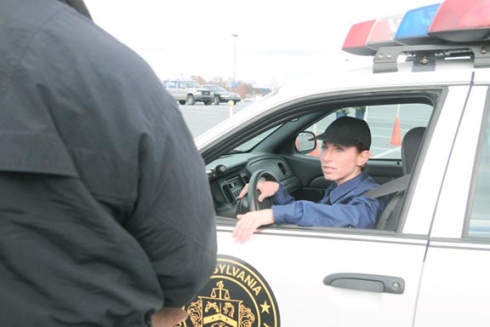 |
|
Pennsylvania State Police Cadet Driver Training |
|
 |
“In Pottsville, the probationer is given daily schooling in the criminal, forestry,
and game laws of the state, with daily mounted and dismounted drill, is taught the care of
horses, and of arms and equipment, and is instructed in general in the duties of the
police.” ca. 1910: Katherine Mayo, Justice to All, first published in 1917.
A History of Excellence in Training
Initially, newly enlisted Pennsylvania State Policemen, “probationers”, would
turn to the commanding officer and senior men of the Troop for training in the skills they
needed for police work. A more standardized and efficient method was needed and in 1910
Superintendent Groome designated Troop “C” Pottsville as a training center for
all student recruits.
In May of 1921, Act 386 allowed for the first official State Police Training School to be
established in Newville. Three years later it moved to better facilities in Hershey. From
1924 to 1959 the Hershey Training School molded student recruits into the finest Troopers
in the nation. However, as the complement grew steadily, it became apparent that the needs
of the Department were outgrowing the facilities on Cocoa Avenue.
In an effort to keep the Training School in the area, the Hershey Estates Board of
Directors sold 28 acres of land situated atop “The Hill”, which allowed the
Department to build a state-of-the-art facility. Act 112 of 1959 pronounced that the new
training school be known as the State Police Academy, rather than the State Police
Training School and in 1960 Amendment No. 45 changed the enlistee’s title from
Student Recruit to Cadet.
Still the Best and Brightest
Due to this legacy of intense and thorough training, the Pennsylvania State Police Academy
is still considered the West Point of all police training schools in the country, and
continues to produce the most well-trained Troopers in the world.
Currently, the training offered at the Academy is designed to prepare the cadets for field
assignments. There is an emphasis on such subjects as Criminal Law and Procedure, the
Vehicle Code, Accident Investigation, Firearms Training, and Self-Defense. One of the
unique phases of the student’s training revolves around equitation skills. By
mastering a horse, the students also learn to master themselves.
Despite the excellent instruction the new recruits receive at the Academy, their abilities
must be developed and seasoned with actual experience in the field. Field Training
Officers help a new Trooper couple Academy experience with initiative and action to
continue training and apply the
skills they have learned.
Specialized Services in Training
In addition to Cadet training, the Academy and former training schools have also performed
specialized police services as needed. Today, the Academy coordinates community service
programs, oversees the Ceremonial Unit and Tactical Mounted Unit, and offers in-service
training programs for State Police personnel and training courses for municipal officers.
Other services no longer performed for various reasons included offering police service to
the local community, underwater rescue, safety dog and rodeo exhibition programs,
bloodhound tracking program, and participation at annual horse shows and pistol team
competitions. A Civil Defense truck, elaborately equipped for the time (ca. 1960) was also
located at the Academy. Its purpose was to respond to a disaster area with a crew of
Academy staff, trained to handle the equipment in the truck.
 |
|
|